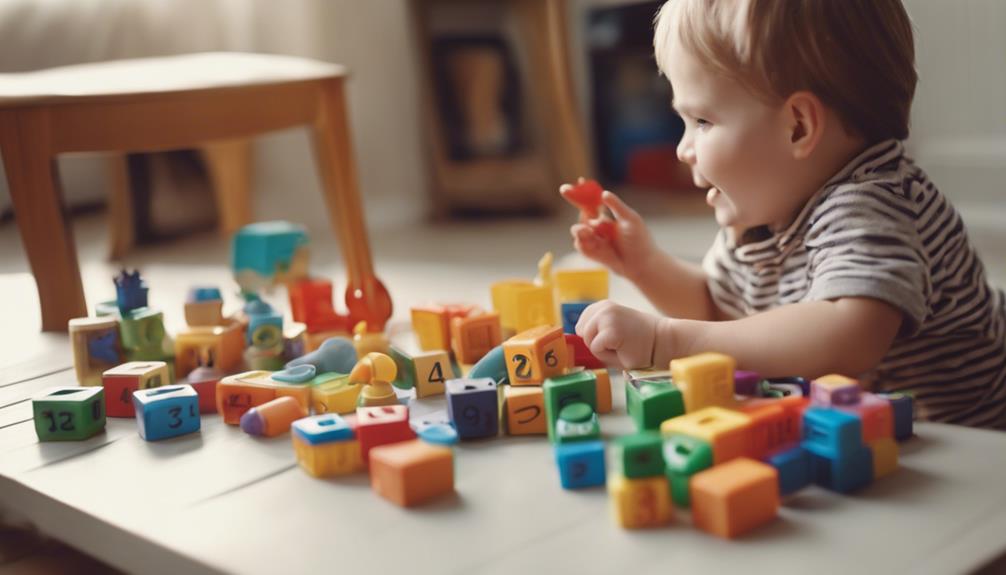Engaging your child early with basic words and numbers is crucial for cognitive development and academic preparedness. Starting with activities that focus on words and numbers helps establish a strong educational foundation. Interactive object learning, repetition techniques, and music all contribute to memory and understanding. Strategies for building vocabulary and creating interactive learning experiences can enhance cognitive skills. Introducing numbers early on can boost problem-solving skills. Fostering language development at a young age supports vocabulary expansion. Baby First Words and Numbers can ignite curiosity and a love for learning. To learn more about the benefits and techniques of early learning, explore further into the researched methods.
Key Takeaways
- Interactive digital resources aid in early learning through engaging activities like matching games and puzzles.
- Music enhances vocabulary and number learning with catchy tunes and rhythmic patterns.
- Repetition and recall techniques strengthen memory retention for words like table, doll, ladder, train, and drum.
- Engaging with objects like tables, dolls, and drums enhances cognitive skills and vocabulary.
- Starting math education early fosters numeracy development, setting the stage for future academic success.
Importance of Early Learning
Developing essential cognitive skills in children begins with early learning, setting the foundation for future academic success. Early exposure to words and numbers plays a vital role in enhancing language and math abilities. Research shows that children who engage in early learning activities tend to have improved communication and problem-solving skills. By starting early with learning words and numbers, children's confidence and curiosity are boosted, laying the groundwork for their educational journey.
Studies have highlighted the significance of early learning in shaping a child's cognitive development. Exposure to language and numbers at a young age can have a lasting impact on a child's academic performance. Moreover, early learning experiences create a solid foundation for future learning, promoting a love for exploring new concepts and ideas.
Providing children with opportunities to engage with educational materials from an early age can set them up for success in various academic endeavors.
Engaging With Objects for Learning

Interacting with various objects in educational settings is a dynamic way to enhance vocabulary and cognitive skills in young children. By engaging with objects like tables, dolls, ladders, trains, and drums, children can actively participate in the learning process.
Encouraging kids to repeat the names of objects out loud reinforces their understanding and retention of new words. This hands-on approach helps children associate words with visuals, making the learning experience more interactive and memorable.
Object interaction helps children associate words with visuals for better retention. A variety of objects, including chairs, bananas, motorcycles, apples, and umbrellas, are introduced for vocabulary learning.
The show features Larry interacting with objects to teach vocabulary, keeping children engaged and interested in learning. Children are encouraged to repeat the names of objects out loud to reinforce learning.
Repetition and Recall Techniques
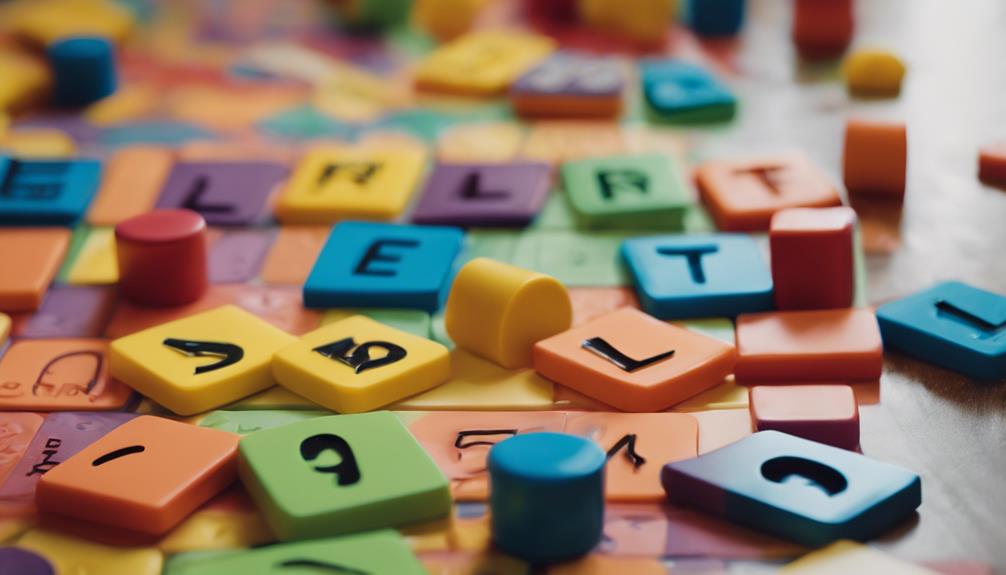
Engaging with objects in the show involves repetitive interactions that aid in memory retention and word recall for young children. Through consistent repetition of words like table, doll, ladder, train, and drum, children are encouraged to recall and verbalize these terms.
This repetitive vocabulary learning approach not only helps in memory retention but also strengthens word association skills. Larry's role in interacting with objects multiple times reinforces the names, thereby enhancing children's ability to remember them.
By combining repetition and recall techniques in the educational content of the show, children's early learning experiences are enriched. The show's strategic use of repetition and recall serves as a foundational learning tool for building a child's vocabulary and cognitive abilities.
This methodical approach fosters a deeper understanding of words and objects, laying a solid groundwork for language development in young viewers.
Music as a Learning Tool

Music enhances early learning by serving as a powerful tool for aiding in the acquisition of words and numbers in young children. Incorporating catchy tunes and melodies into educational content makes learning engaging and enjoyable.
The show's use of musical elements helps children remember and recall words and numbers more easily. Rhythmic patterns present in music play a crucial role in enhancing memory retention of vocabulary and numerical concepts.
The combination of music and learning creates a fun and interactive educational experience for young children.
- Music is used as a tool to aid in early learning of words and numbers.
- The show incorporates catchy tunes and melodies to make learning engaging.
- Musical elements help children remember and recall words and numbers more easily.
- Rhythmic patterns in music can enhance memory retention of vocabulary and numerical concepts.
Vocabulary Building Strategies
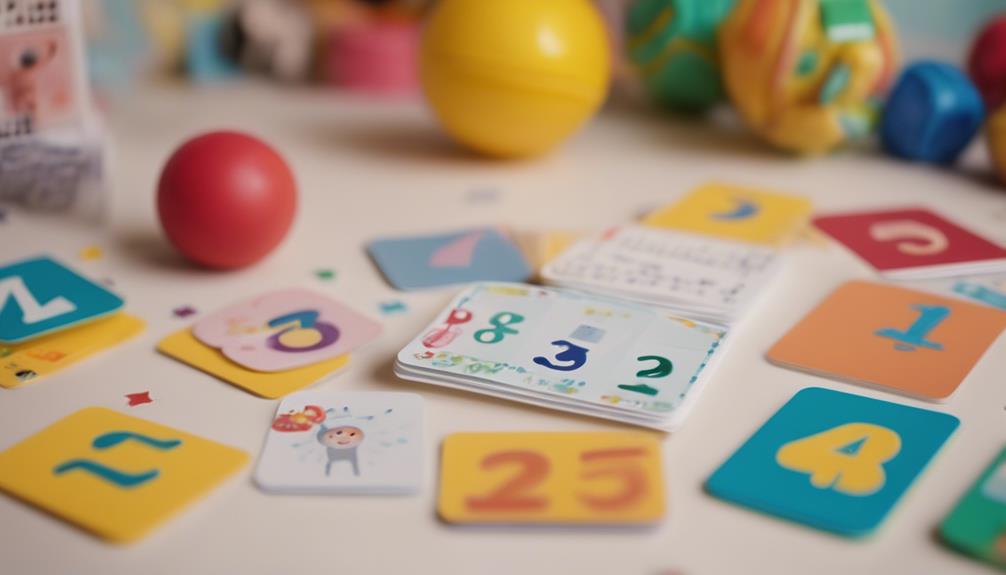
To reinforce vocabulary building in early learners, repetition and association techniques are utilized effectively. By encouraging active participation, children can repeat words out loud, enhancing memory retention.
Hands-on interactions with objects create visual and tactile learning experiences, aiding in vocabulary acquisition. Introducing a variety of objects not only expands vocabulary but also stimulates curiosity in young minds, fostering a love for learning.
Combining music with educational content makes vocabulary building engaging and enjoyable for children, creating a multisensory learning environment.
Repetition helps solidify new words in a child's memory, while association techniques link words to real-life objects or experiences, making learning more relatable. When children actively engage with words through repetition and association, they're more likely to retain and understand them.
Incorporating diverse objects into vocabulary lessons exposes children to a range of concepts, enriching their language skills. By integrating music into vocabulary building activities, children can have fun while learning, enhancing their overall learning experience.
Numeracy Development in Infants

When it comes to numeracy development in infants, early exposure to numbers and counting is essential.
By engaging in activities like counting fingers or toys, infants can start building their number recognition and basic math understanding.
Providing a nurturing environment that incorporates number-related toys and routines sets the foundation for future math skills and problem-solving abilities.
Early Number Recognition
From as early as 6 months old, infants can begin developing numeracy skills by recognizing and responding to numbers. Early number recognition in babies involves identifying and associating numbers with quantities in their environment.
Simple activities like counting objects, fingers, or toes can help infants build a foundation for numeracy development. Research suggests that babies as young as 10 months old can demonstrate basic number sense and understanding of quantity.
Early exposure to numbers through play and everyday interactions can support infants in developing numerical concepts.
- Recognizing and associating numbers with quantities.
- Engaging in activities like counting objects, fingers, or toes.
- Demonstrating basic number sense as young as 10 months old.
- Supporting numeracy development through early exposure to numbers in play and daily interactions.
Counting Skills Development
Infants' counting skills development lays an essential foundation for their early numeracy abilities and cognitive growth. Introducing numbers in a simple and engaging manner, such as through counting fingers, toes, or toys, can kickstart their journey into the world of numeracy. This early exposure to counting not only fosters basic math skills but also promotes cognitive development, preparing infants for more complex mathematical concepts down the line.
Engaging in activities that involve counting objects or sounds can greatly enhance infants' number recognition and sequencing abilities. These interactions with numbers at a tender age are vital as they form the basis for future mathematical understanding and problem-solving skills. By focusing on numeracy development in infants, caregivers and educators can set the stage for a solid mathematical foundation, ensuring that infants are equipped with the necessary skills to tackle more challenging math concepts in the future.
Understanding Basic Math
Developing a strong foundation in basic math, such as counting, sorting, and number recognition, is essential for infants' early numeracy development. Understanding basic math concepts lays the groundwork for future mathematical proficiency.
Here are some key points to keep in mind:
- Early exposure to numbers and math can enhance cognitive development and problem-solving skills in young children.
- Activities like counting objects, identifying shapes, and simple addition can help infants build a foundation for mathematical understanding.
- Infants can start recognizing numbers and basic math symbols as early as 6-12 months old, showing the potential for early numeracy development.
- Encouraging numeracy development in infancy sets the stage for future math success and academic achievement, highlighting the importance of starting math education from a young age.
Interactive Learning Experience
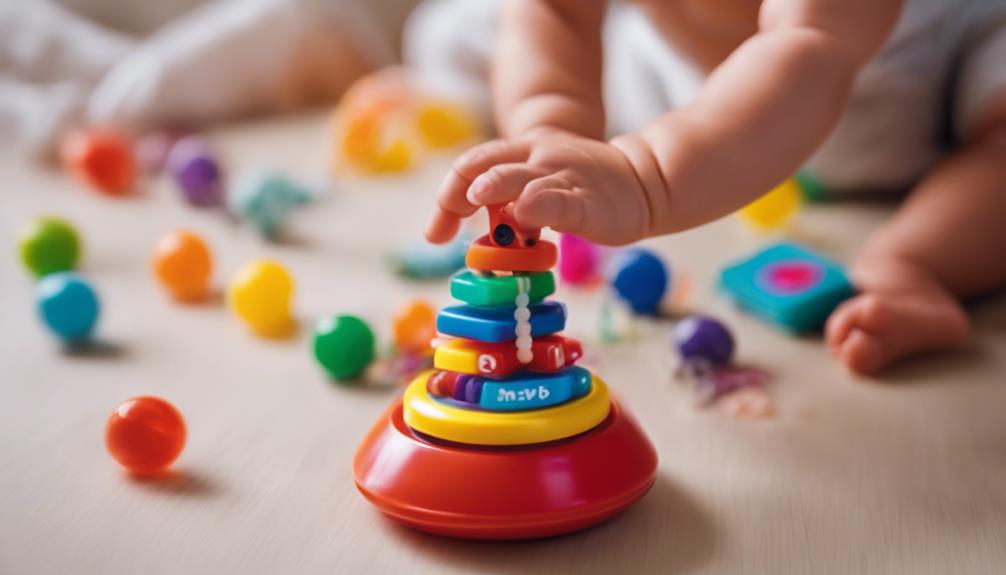
When engaging in the interactive learning experience of Baby First Words and Numbers, you'll encounter a range of fun learning activities that captivate young minds.
These activities are designed to be engaging educational tools that stimulate curiosity and foster cognitive development.
With the use of interactive digital resources, children can actively participate in the learning process, enhancing their understanding of vocabulary and object associations.
Fun Learning Activities
Engage your child in interactive learning experiences that foster cognitive development and early math skills through fun activities like naming objects and counting numbers. These activities are designed to promote essential skills while keeping your child entertained and engaged.
Here are some interactive learning ideas for your child:
- Naming Objects: Encourage your child to identify and name different objects around them, helping to build their vocabulary and language skills.
- Counting Numbers: Practice counting with your child using everyday objects or toys, enhancing their early math skills and number recognition.
- Matching Shapes: Engage in activities where your child matches shapes to corresponding objects, aiding in shape recognition and cognitive development.
- Solving Simple Puzzles: Introduce puzzles suitable for your child's age, promoting problem-solving skills and logical thinking.
These hands-on activities not only provide a fun learning experience but also lay a strong foundation for your child's development in various areas.
Engaging Educational Tools
Explore how interactive learning tools in Baby First Words and Numbers offer a dynamic and engaging educational experience for children.
These tools provide a hands-on approach, allowing children to tap, swipe, and interact with the app to learn words and numbers in an enjoyable and interactive manner. By incorporating audio, visuals, and touch interactions, the app offers an essential learning experience that enhances comprehension.
Through the interactive features, children can develop important early learning skills like object recognition, vocabulary building, and number recognition.
The engaging activities and games within the app enable children to practice pronunciation, spelling, and counting while having fun. This interactive learning experience not only makes learning more enjoyable for children but also helps them retain information better.
Interactive Digital Resources
Interactive digital resources in Baby First Words and Numbers present a hands-on learning experience for children, allowing them to engage with first words and numbers through various activities and tools. These resources offer a dynamic and personalized approach to early learning, adapting to individual learning styles and progress.
They often feature engaging activities like matching games, puzzles, and quizzes to reinforce learning. Children can interact with digital tools such as touchscreens and voice commands, enhancing their early learning skills in a fun and interactive way. The use of interactive technology not only helps in improving children's cognitive development but also aids in language acquisition.
Cognitive Benefits of Early Exposure
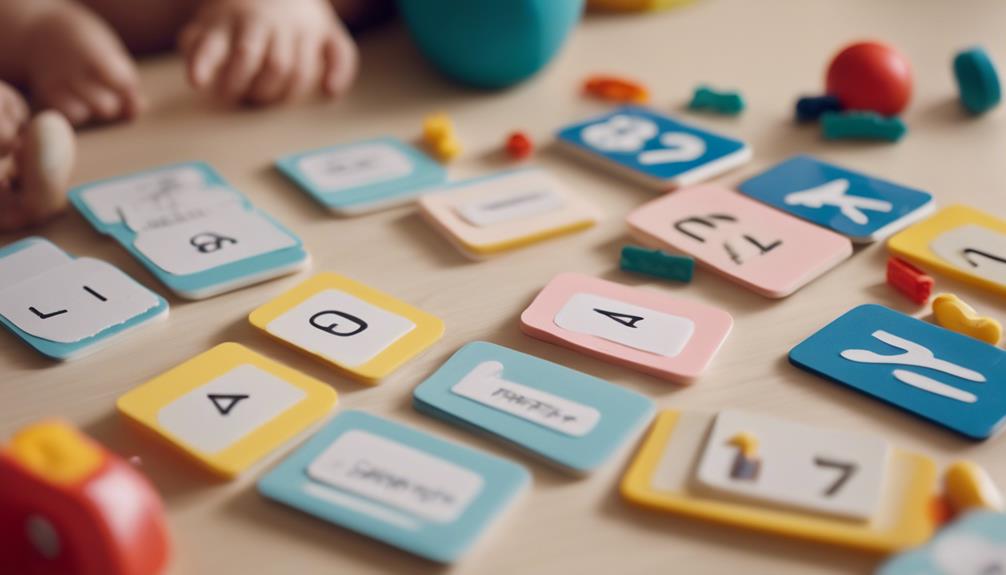
Early exposure to words and numbers can greatly enhance your child's cognitive development. Research indicates that introducing language and numerical concepts at an early age can lead to improved academic performance in the future.
By engaging with words and numbers from an early stage, children can enhance their memory, attention span, and problem-solving abilities. These cognitive benefits extend to increased language proficiency, numeracy skills, and critical thinking capacities.
Creating a stimulating environment rich in words and numbers can positively influence your child's cognitive development trajectory. Studies have shown that children who are exposed to language and numerical concepts early on tend to exhibit advanced cognitive skills compared to those who receive less exposure.
Incorporating words and numbers into your child's early learning experiences can lay a strong foundation for their cognitive growth and academic success later in life.
Encouraging Language Development
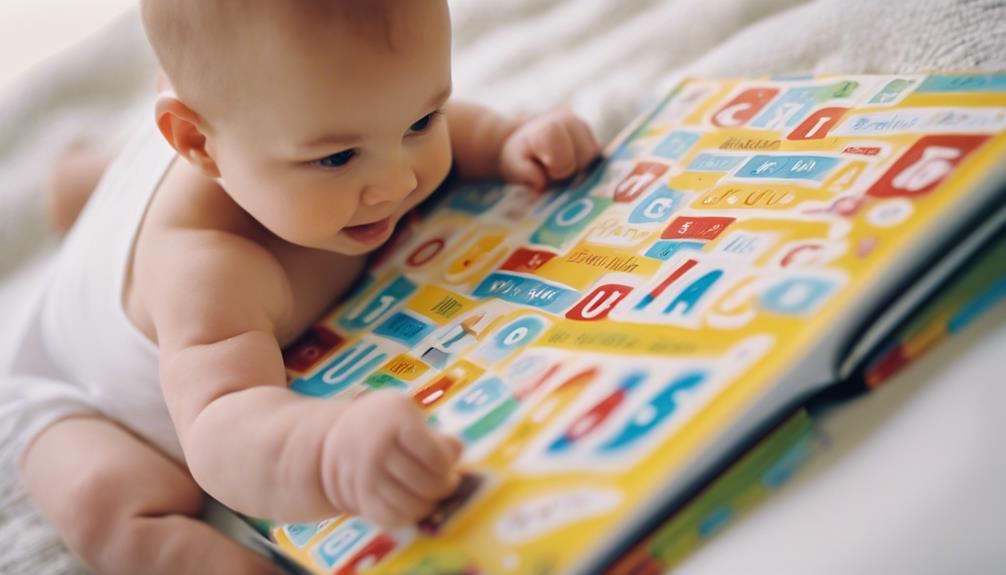
To support your child's cognitive development, fostering language skills is essential. Encouraging language development involves exposing children to new words and concepts. Language development plays a vital role in communication and cognitive growth during early childhood.
Interactive activities like naming objects and repeating words can aid in language acquisition. Early exposure to language through educational shows like Baby First Words and Numbers can enhance vocabulary skills. Engaging children in language activities from a young age can lay a strong foundation for future learning.
- Expose your child to a variety of words and concepts.
- Engage in interactive activities such as naming objects and repeating words.
- Utilize educational shows like Baby First Words and Numbers for early language exposure.
- Start language development activities early to build a strong foundation for future learning.
Fostering a Love for Learning

Baby First Words and Numbers excels at cultivating curiosity in young children, encouraging exploration and play as essential components of early learning. By providing a stimulating environment filled with interactive activities, the program effectively builds strong foundations for future educational pursuits.
Through a focus on enjoyable learning experiences, children are motivated to develop a lifelong love for acquiring knowledge and understanding new concepts.
Cultivating Curiosity in Children
Cultivating curiosity in children involves creating an engaging learning environment that sparks their sense of wonder and exploration. By providing interactive learning experiences, children can develop a natural inclination towards curiosity and a love for learning.
Here are some key points to bear in mind:
- Interactive Learning Experiences: Engage children in hands-on activities and opportunities for exploration to stimulate their curiosity and interest in acquiring knowledge.
- Lifelong Curiosity: Fostering a love for learning at an early age can lead to a lifelong passion for exploration and discovery.
- Hands-On Activities: Providing chances for children to actively participate in learning through experiments and discovery can enhance their curiosity and engagement.
- Encouraging Creativity: By encouraging questions, exploration, and creativity, children can develop a deep-seated curiosity that drives their desire to learn and understand the world around them.
Creating a stimulating environment that nurtures children's innate sense of wonder can lay the foundation for a lifelong journey of curiosity and learning.
Encouraging Exploration and Play
Encourage children's natural curiosity and love for learning by fostering exploration and play in their early educational experiences. Through these activities, children develop a sense of wonder and discovery, allowing them to engage with new concepts and ideas.
Play-based learning experiences are particularly beneficial as they promote creativity and problem-solving skills in young learners. Hands-on activities and exploration not only make learning fun but also enhance cognitive development and critical thinking skills.
Providing opportunities for play and exploration can have long-lasting effects on a child's educational journey. By allowing children to explore the world around them in a meaningful way, they're more likely to develop a lifelong passion for learning and discovery.
This early exposure to interactive learning experiences sets a strong foundation for future academic success and fosters a love for exploring new ideas and concepts. Encouraging exploration and play in early learning is a powerful tool in nurturing a child's intellectual growth and development.
Building Strong Foundations
Nurturing a passion for learning in the formative years is key to establishing a solid educational foundation for young children. By fostering a love for learning early on, you lay the groundwork for a lifetime of academic success.
Here are some key ways to build strong foundations in early learning:
- Encouraging curiosity and exploration: Engaging children in activities that promote curiosity and exploration helps them develop a positive attitude towards learning, making it a natural and enjoyable part of their lives.
- Early exposure to words, numbers, and concepts: Introducing young children to language, numbers, and basic concepts at an early age can enhance their cognitive development and language skills, setting the stage for future academic achievements.
- Creating a supportive learning environment: Providing a supportive and stimulating environment where children feel encouraged to discover and grow nurtures their natural inclination towards learning and exploration.
- Enhancing critical thinking abilities: Building strong foundations in early learning can lead to better academic performance and improved critical thinking skills later in life, preparing children for future challenges and opportunities.
Frequently Asked Questions
When Should Babies Say Their First Word?
Around 10-14 months, most babies say their first word, but it varies. By 18 months, many babies can say 5-20 words. Factors like language exposure and parental interaction influence when you hear your baby's first word.
How to Teach Baby First Words?
To teach baby first words, repeat and be consistent. Use gestures and enthusiasm. Label objects and read regularly. Point to things while speaking. Play with interactive toys. Make learning fun and engaging for your baby.
What Counts as a First Word?
In your child's world, that initial utterance, be it 'mama,' 'dog,' or 'ball,' marks their first word. It's a milestone reflecting their budding communication skills and a glimpse into their growing abilities.
What Are the Most Common First Words?
When you're starting out, common first words for babies include 'mama,' 'dada,' 'bye-bye,' 'up,' and 'no.' As you learn and grow, you'll also pick up words like 'ball,' 'dog,' and 'book.'
Conclusion
To sum up, early learning is the key to opening up a world of knowledge for your little one.
Just as a seed needs water and sunlight to grow, a child needs engaging experiences and interactive tools to nurture their young minds.
By fostering a love for learning from the very beginning, you're planting the seeds for a bright and successful future.
Remember, every word and number learned is a building block towards a lifetime of discovery and achievement.
So, start early and watch them flourish!

